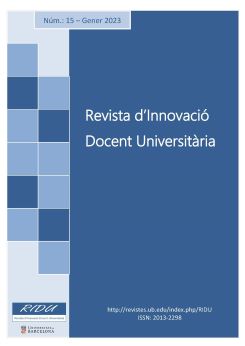The interview through role-playing as a strategy for developing oral communication skills
DOI:
https://doi.org/10.1344/RIDU2023.15.6Keywords:
Oral expression, Interview, Role-playing, Rubric, Peer assessmentAbstract
This paper presents an experience of educational innovation carried out in the subjects Diagnosis and Evaluation of Special Education Needs, and Diagnosis and Evaluation of Hearing and Language Disorders, both belonging to the fourth year of the Degree in Primary Education at the University of León. The training action described consists of the development of interviews as a strategy to develop oral expression, using processes of peer assessment and self-assessment of learning. For the implementation of the activity, a five-phase process has been followed: design of the activity and the evaluation instrument, execution of the activity, analysis of the results, evaluation of the training action and redefinition of the activity. Although the different phases are detailed in this document, emphasis has been placed on the evaluation of the activity, whose data has been collected through the formulation of open questions to the students of the 2021/2022 academic year. MAXQDA 2022 software was used for the analysis of the answers, accounting for a total of 73 codes around aspects such as the usefulness and opinion on the role-playing technique, the suitability of the peer assessment, the adequacy of the rubric or the overall assessment of the activity. The results showed that the students positively value this type of activity, since it brings them closer to the reality that they will find in the classrooms of any educational center in a simulated way. However, the improvement proposals of the students have been considered to make adjustments, both in the development of the activity and in its rubric. It is concluded that role-playing through interviews is an ideal technique, not only for the development of oral expression, but also for other skills that, as specialist teachers, they will put into practice in their professional future.
References
Airado, D., González, D., Jeong, J. S., y Cañada, F. (2016). Implantación de un sistema de coevaluación asistida por rúbricas con estudiantes del Grado de Educación Primaria. En J. Sánchez y F. Cañada (Coords.), Ciencias para comprender el mundo. Investigación e innovación didáctica de las Ciencias Experimentales (pp. 9-18). Entimena.
Álvarez Valdivia, I. (2008). La coevaluación como alternativa para mejorar la calidad del aprendizaje de los estudiantes universitarios: valoración de una experiencia. Revista Interuniversitaria de Formación del Profesorado, 63(22.3), 127-140. http://hdl.handle.net/11162/36687
Ayala, N., Mora, R., Lora, A. J., Molina, A. M., y Moyano, M. R. (2020). Desarrollo e implementación de un blog colaborativo como instrumento de coevaluación en el Grado de Veterinaria. Revista de Innovación y Buenas Prácticas Docentes, 9(1), 61-70. https://doi.org/10.21071/ripadoc.v9i1.12610
Delgado, E. J., Mengual, S., López, E., y Vázquez-Cano, E. (2015). La justicia evaluativa en la valoración de proyectos grupales: propuesta y aplicación en el Grado de Educación Primaria. Pulso, 38, 163-177. https://revistas.cardenalcisneros.es/index.php/PULSO/article/view/191
Ferrari, A., Spoletini, P., Bano, M., y Zowghi, D. (2020). SAPEER and REVERSESAPEER: Teaching requirements elicitation interviews with role-playing and role reversal. Requirements Engineering, 25, 417-438. https://doi.org/10.1007/s00766-020-00334-0
Ferreira, C., y Vieira, M. J. (2021). La simulación de entrevistas familiares en la formación de maestros y orientadores. MLS Educational Research, 5(2), 26-38. https://doi.org/10.29314/mlser.v5i2.553
Gessa, A. (2011). La coevaluación como metodología complementaria de la evaluación del aprendizaje. Análisis y reflexión en las aulas universitarias. Revista de Educación, 354, 749-764. http://hdl.handle.net/11162/80923
González-Alonso, M. I., García-González, M. E., Domínguez-Fernández, R., Diez-Fernández, A., y Fernández-Fernández, R. (2020). La coevaluación de la práctica docente universitaria: una experiencia de éxito. En I. Bakkali (Coord.), Hacia una educación transformadora: propuestas, proyectos y experiencias (pp. 106-117). Adaya Press.
Holohan, A. (2019). Transformative training in soft skills for peacekeepers: Gaming for Peace. International Peacekeeping, 26(5), 556-578. https://doi.org/10.1080/13533312.2019.1623677
Liebrecht, C., y Montenery, S. (2016). Use of simulated psychosocial role-playing to enhance nursing students’ development of soft skills. Creative Nursing, 22(3). https://doi.org/10.1891/1078-4535.22.3.171
López-Pastor, V. M., y Pérez-Pueyo, Á. (2017). Evaluación formativa y compartida en educación: experiencias de éxito en todas las etapas educativas. Universidad de León.
Maureira-Cabrera, O., Vásquez-Astudillo, M., Garrido-Valdenegro, F., y Olivares-Silva, M. J. (2020). Evaluación y coevaluación de aprendizajes en blended learning en educación superior. Alteridad, 15(2), 174-189. https://doi.org/10.17163/alt.v15n2.2020.04
Orden EDU/849/2010, de 18 de marzo, por la que se regula la ordenación de la educación del alumnado con necesidad de apoyo educativo y se regulan los servicios de orientación educativa en el ámbito de gestión del Ministerio de Educación, en las ciudades de Ceuta y Melilla. BOE nº 83, de 6 de abril de 2010, 31332-31380.
Padilla, M. T. (2002). Técnicas e instrumentos para el diagnóstico y la evaluación educativa. CCS.
Rekalde, I., y Pérez-Sostoa, V. (2015). Construyendo tareas auténticas para el desarrollo de competencias profesionales en la educación superior: El uso del Role-Play en el Grado de Pedagogía. Revista d’Innovació Docent Universitària, 7, 81-96. https://doi.org/10.1344/RIDU2015.7.9
Downloads
Published
Issue
Section
License
Copyright (c) 2023 Diego González-Rodríguez, Héctor González-Mayorga

This work is licensed under a Creative Commons Attribution 4.0 International License.
Authors whishing to publish in this journal agree to the following conditions:
- The author or author retain copyright and grants the journal the right of first publication of the paper.
- The texts will be published under license "Reconocimiento Creative Commons 4.0 España", which allows to share, distribute, reproduce and the public communication of the paper, as long as the name of the author or authors and the journal are clearly stated.







